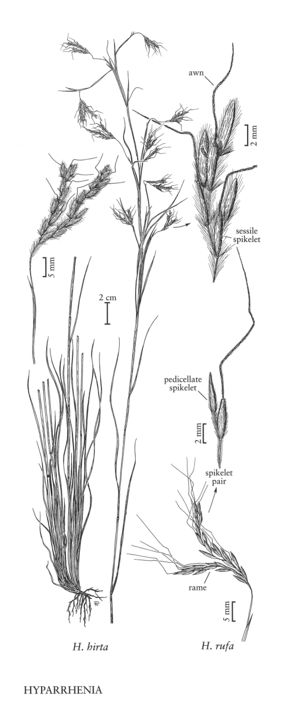Difference between revisions of "Hyparrhenia rufa"
FNA>Volume Importer |
FNA>Volume Importer |
||
| Line 17: | Line 17: | ||
-->{{Treatment/Body | -->{{Treatment/Body | ||
|distribution=Puerto Rico;Pacific Islands (Hawaii);Fla. | |distribution=Puerto Rico;Pacific Islands (Hawaii);Fla. | ||
| − | |discussion=<p | + | |discussion=<p>Hyparrhenia rufa is native to the Eastern Hemisphere tropics, but is now established in tropical America. It grows in ditches, pastures, swamps, and pine flatwoods, and along roadsides, in the southeastern United States.</p> |
|tables= | |tables= | ||
|references= | |references= | ||
| Line 33: | Line 33: | ||
|basionyms= | |basionyms= | ||
|family=Poaceae | |family=Poaceae | ||
| + | |illustrator=Linda A. Vorobik and Hana Pazdírková | ||
|distribution=Puerto Rico;Pacific Islands (Hawaii);Fla. | |distribution=Puerto Rico;Pacific Islands (Hawaii);Fla. | ||
|reference=None | |reference=None | ||
| Line 38: | Line 39: | ||
|publication year= | |publication year= | ||
|special status= | |special status= | ||
| − | |source xml=https:// | + | |source xml=https://bibilujan@bitbucket.org/aafc-mbb/fna-data-curation.git/src/314eb390f968962f596ae85f506b4b3db8683b1b/coarse_grained_fna_xml/V25/V25_1628.xml |
|subfamily=Poaceae subfam. Panicoideae | |subfamily=Poaceae subfam. Panicoideae | ||
|tribe=Poaceae tribe Andropogoneae | |tribe=Poaceae tribe Andropogoneae | ||
Revision as of 16:16, 30 October 2019
Plants usually perennial; cespitose but with short rhizomes. Culms 30-350 cm. Sheaths glabrous; blades 30-60 cm long, 2-8 mm wide. Peduncles 0.7-7 cm; rames 1.5-2.5 cm, 1 almost sessile, the other with a 6-10 mm stalk, both with 7-14 heterogamous spikelet pairs. Glumes of all spikelets moderately densely pubescent, hairs reddish. Sessile spikelets of homogamous pairs 3-5.5 mm, sessile spikelets of heterogamous pairs 3.2-4.2 mm; lemmas awned, awns 2-3 cm. Pedicellate spikelets 3-5 mm. 2n = 30, 36, 40.
Distribution
Puerto Rico, Pacific Islands (Hawaii), Fla.
Discussion
Hyparrhenia rufa is native to the Eastern Hemisphere tropics, but is now established in tropical America. It grows in ditches, pastures, swamps, and pine flatwoods, and along roadsides, in the southeastern United States.
Selected References
None.
